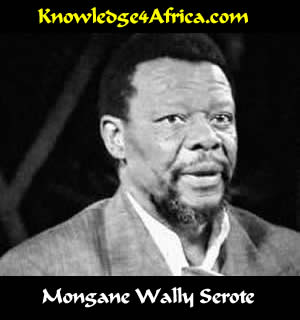|
READ THIS
This is a somewhat out-of-date social comment about life in Johannesburg at the heart of the apartheid
era. The narrator is a black South African who is discriminated against and whose purpose in the city is
purely to supply the labour market. Life is one of hardship where working hours are long and happiness
is non-existent.
 A NOTE ON THE POET
A NOTE ON THE POET
Mongane Wally Serote was born in Sophiatown in 1944. He grew up during the violent days of the
apartheid era and was arrested on a few occasions, even serving nine months in solitary confinement in
1969 for an unspecified "crime", but was finally released without any charges being brought against
him.
The poet was also under "house arrest" for three years, i.e. he was made a prisoner in his own
house and forbidden to leave the grounds for whatever reason.
Indeed, if a person was "banned" or placed under house arrest, there was no recourse to law. One
could not challenge it -- nor did the banning authorities have to prove anything or even produce any
evidence whatever to justify their decision.
In 1974 Serote was awarded the Fulbright scholarship which enabled him to study Fine Arts at the
Columbia University in New York. He returned to South Africa in 1979 but chose to go into self-exile in
Botswana, returning to South Africa only in 1990 with the collapse of the apartheid system. He would
serve in the first post-apartheid parliament.
He is renowned for his poetry, although he has also written short stories and a couple of novels. His work
has won him several awards.
Have you looked at the questions
in the right column?
|
TEST YOURSELF!
Read the left column and then answer
the following questions:
"That is the time when I come to you,
When your neon flowers flaunt from your electrical wind,
That is the time when I leave you,
When your neon flowers flaunt their way through the falling darkness
On your cement trees."
- What point is the poet making when he speaks of the neon lights when he arrives in the city in the
morning and again when he leaves the city at night? (2)

[Need help?]
The poet is drawing attention to his extreme hours of work. It is still dark when he arrives at work in the
morning and it is already dark when he sets off home again in the evening. He never sees the light of day
unless his work takes him outside.
|
- Comment on the imagery in the words "your neon flowers flaunt their way through the falling
darkness". (4)

[Need help?]
The neon lights are bright and gaudy, lighting up the night-time. They are compared to prostitutes who
dress seductively to draw attention to themselves. Both do most of their work after dark.
|
- What are the "cement trees"? (2)

[Need help?]
Please don't say they are the lamp-posts! Lamp-posts in Johannesburg at the time of writing this poem
were made of cast iron, certainly not concrete.
No, the author is probably referring to the concrete skyscraper buildings. The city is a forest of
skyscrapers.
|
"I can feel your roots, anchoring your might, my feebleness
In my flesh, in my mind, in my blood,
And everything about you says it,
That, that is all you need of me."
- Explain what it is that Johannesburg needs of the poet. (4)

[Need help?]
The city cares nothing for the poet and his people. It cares only about work. The poet and his people
make up the work-force. The city cares only about what they do, not about what they are.
|
- What are "the roots" of which the poet speaks? (4)

[Need help?]
It is possible that the poet has in mind the massive basements to each of these skyscrapers. Each
building went several stories underground, with their roots deep beneath the surface of the streets.
On the other hand, it is possible that the poet has a metaphysical meaning. The city is a forest of concrete
trees, with roots that delve deep down into the person's soul, representing exploitation of the workforce.
|
- What is an "oxymoron". Explain the oxymoron "your might, my
feebleness". (4)

[Need help?]
An oxymoron is the placing of words of opposite meaning side by side: "Oh, happy sadness." In
the case in question, "might" and "feebleness" is an oxymoron.
The poet is trying to illustrate the immense power of the city even to destroy the very souls of people, as
opposed to the weakness of its inhabitants -- and especially its black inhabitants who were exploited but
were powerless to prevent it.
|
"When you leave the women and men with such frozen expressions,
Expressions that have tears like furrows of soil erosion."
- What is the cause of the women and men wearing "such frozen
expressions"? (4)

[Need help?]
The immense suffering and hardship of the people meant that there could be little joy in their lives. One
would not therefore find smiling, happy faces but rather frozen expressions which showed little passion,
not even sorrow and pain.
|
- Provide ONE South African word used in this poem which means "furrows of soil
erosion". (1)

[Need help?]
- In what way are the tears of the women and the men "like furrows of soil
erosion"? (4)

[Need help?]
Soil erosion represents the destruction of the soil, making it lifeless and useless.
Life in City Johannesburg brought about the destruction of the soul so that whenever there were indeed
tears, it meant that suffering and hardship was already so deep that there were craters in the soul.
|
|



